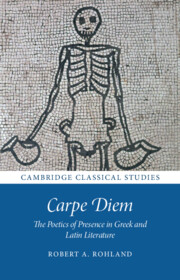Acknowledgements
This is a book about pleasure. It is a particular pleasure to acknowledge the debts I have incurred when writing this book. My greatest debt is to the two supervisors of the Cambridge dissertation on which this book is based; I owe a great deal to my Doktormutter Emily Gowers for her generosity, learnedness, and inspiration. Every page benefited from her advice. I also owe a great deal to Richard Hunter, who provided erudition and advice throughout. For a book that makes a great deal of what it means to read carpe diem, I could not have wished for better readers.
I am extremely grateful to the examiners of my thesis, William Fitzgerald and Philip Hardie, for their numerous helpful suggestions and the exciting discussion during the viva. Their comments provided the stimulus for transforming the thesis into a book. Yet almost as often as I was returning to their written comments, I was returning to them, asking them for their opinions on draft chapters, on which they made numerous helpful comments. Stephen Oakley as editor of Cambridge Classical Studies read through a whole draft of the work. His comments not only saved me from many errors but also prompted me to rewrite one chapter and add an entirely new section at the beginning. I owe him my thanks for his detailed comments and helpful criticism. Thanks are also due to a number of people who read drafts of individual chapters and generously offered their comments: John MacGinnis, Emily Pillinger, William Race, and Caroline Vout. The book greatly benefited from their advice. David Sedley kindly offered some comments on a specific problem in writing. Giulia Maltagliati generously gave advice on a papyrus. On various occasions audiences listened to versions of several chapters. Their questions and comments have improved the work at a number of points.
After my doctorate I joined the University of Warwick for one year as a teaching fellow, where I was very fortunate to have colleagues who generously offered advice on my project. David Fearn discussed the methodology and big picture with me already at a crucial stage of the dissertation and then again as I began the work on the transformation from thesis to book. Victoria Rimell offered probing questions that made me rethink the introduction of the book.
I wish to express my gratitude to the Cambridge School of Arts and Humanities, which funded my doctorate. It is thanks to their generosity that this project could be undertaken. I also owe thanks to the Faculty of Classics at Cambridge for a grant during the final stage of the doctorate. Yet my debt to the Faculty far exceeds material matters; Cambridge offered a congenial working environment for this project.
My election to a junior research fellowship at Trinity College, Cambridge gave me the time to turn the thesis into a book. I am extremely grateful to Trinity for providing me with the freedom and stimulating environment that allowed me to revise the book. Particular thanks are also due to the staff at the library of the Faculty of Classics at Cambridge, who helped me with many requests. Staff at the University Library got hold of numerous items via inter-library loans. For this I owe them my thanks. Parts of the book were written at the Combined Library of the Institute of Classical Studies and the Hellenic and Roman Societies. Research facilities that are second to none and outstanding staff make this a particularly stimulating place to work. The Roman Society generously funded a research stay at the Fondation Hardt, where I began to work on Chapter 4. At Cambridge University Press, Michael Sharp, Katie Idle, Nicola Maclean, and Dan Shutt guided the production of the book with great care.
I am deeply indebted to my Classics teachers at school, Stefan Gieseke and Wolfgang Krüger, whose inspiring classes at the Kaiser-Wilhelm- und Ratsgymnasium stand at the beginning of my educational journey in Classics. At St Andrews I was then fortunate to be taught by Alex Long, Jason König, and Emma Gee. At Oxford I learned much from Barnaby Taylor. During an exchange year at the University of North Carolina at Chapel Hill, I took fascinating classes by Sharon James and James O’Hara. It was also at Chapel Hill that I had the pleasure of listening to William Race’s wonderful classes on Horace. It is to the inspiration of these classes that this project goes back.
I do not believe that I can do justice here to debts of a more personal nature. My parents, Regine and Hans-Jürgen, have supported me with unfailing kindness. My sister Anna has been a constant source of advice in all matters of life. Most of all I wish to thank my wife, Janet. Without her love and support, this book could not have been written. As the thesis was nearing completion, our first son, Julius, was born, and as I was revising the book manuscript, our second son, Christian, was born. The book that follows has a thing or two to say about time and pleasure. But the most joyous time is the time spent with Janet, Julius, and Christian.



